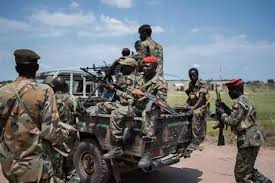More than sixteen months after the start of the conflict in Sudan, the war in this northeast African country continues to spiral out of control, the UN deputy human rights chief warned on Tuesday.
The agency expressed fears that it could take on an ethnic dimension in certain Sudanese provinces, particularly in Darfur, where the Masalit community appears to be the target.
Civilians are bearing the brunt of hostilities between the Sudanese Armed Forces (SAF) and the Rapid Support Forces (RSF), as well as their respective allied armed movements and militias, which are taking place in ‘total disregard for international law’.
”Since the High Commissioner’s update to this Council in March, the conflict has continued to escalate. Statements by the warring parties about their commitment to protect civilians remain empty and violations continue unabated,” said Nada Al-Nashif.
Addressing the UN Human Rights Council, the UN Deputy High Commissioner for Human Rights said she was ‘deeply disturbed by attacks and hate speech motivated by ethnicity’.
Serious abuses against the Masalit community
High Commissioner Volker Türk’s office said it had received ‘numerous testimonies’ of ‘summary executions, sexual violence and forced displacement by Sudanese security forces and allied Arab militias, particularly against the Masalit community in West Darfur’.
Ethnic violence, harassment and arrests have also been documented in Darfur and Al-Jazira,’ the Deputy High Commissioner regretted. Quoted in a statement seen by APA on Tuesday, she noted that the mobilisation of civilians, including children, has intensified throughout Sudan, particularly along ‘tribal lines’. This raises the risk of a wider civil war with new ethnic dimensions, she warned.
Since May, the town of El Fasher in North Darfur has been ravaged by violent fighting: the targeting of medical facilities has deprived the population of health services.
”Arbitrary arrests by both parties and allied armed movements continue. OHCHR has noted an increase in arrests by military intelligence and death sentences for alleged support to RSF, often on the basis of real or perceived tribal identity. We have also documented unlawful detentions, again often based on ethnicity, by the SRF in Darfur”, Nada Al-Nashif added.
Ethnicity-based attacks
For his part, the chairman of the Independent International Fact-Finding Mission on Sudan said that the SRF paramilitaries and their allied militias had carried out large-scale attacks based on ethnicity.
”In particular, the Masalit community in El Geneina has been subjected to serious abuses, including murder, torture, rape and persecution. Our report shows that the Sudanese Armed Forces (SAF) and the Rapid Support Forces (RSF), as well as their respective allied militias, have committed large-scale violations of human rights and international humanitarian law, some of which may amount to war crimes and crimes against humanity”, said Mohamed Chande Othman.
Risks and indicators of genocide
Echoing these worrying reports, the UN Special Adviser on the Prevention of Genocide notes that all the indicators are red.
”Today, I must repeat: we see all the risks and indicators of the crime of genocide, with serious allegations that this crime has already been committed, in Sudan” warned Alice Wairimu Nderitu.
She recalled that the hate speeches and ethnic attacks that took place before eyewitnesses in Darfur, particularly in West Darfur in 2023, have brought to light elements that are highly relevant in determining whether the crime of genocide has been committed.
Deliberate and systematic attacks have been carried out against the Masalit ethnic group, in particular by the Sudanese security forces and allied militias. Entire villages have been burned to the ground.
In this context, derogatory terms such as ‘blacks’ and ‘slaves’ have been widely used to incite violence, amplified by social media platforms.
”Twenty years ago, these same communities were targeted in Darfur. They were targeted for who they were – ethnically and racially. There is still no accountability for past crimes in Darfur, and the lack of accountability has created fertile ground for the current violence”, Wairimu Nderitu lamented.
”My Office has received reports of campaigns of hate speech and incitement to violence, with large-scale information operations glorifying the commission of acts of violence, including against specific protected groups” Ms Nderitu said, adding that ‘leaders have called on civilians to take up arms’.
Sexual violence, a weapon of war
On another front, the Office of the UN High Commissioner for Human Rights (OHCHR) has been particularly alarmed by the use of sexual violence as a weapon of war since the beginning of the conflict. The OHCHR has documented 97 incidents involving 172 victims, mostly women and girls – a gross under-representation of the reality.
Men in the uniform of the paramilitary Rapid Support Forces (RSF) and associated armed men were held responsible for 81% of the incidents. The UN has also received credible reports of sexual violence attributed to the Sudan Armed Forces and allied armed movements.
”We again urge the parties to issue and enforce strict orders prohibiting and punishing sexual violence and to take other effective measures to prevent it,” said Nashif.
TE/sf/lb/as/APA


